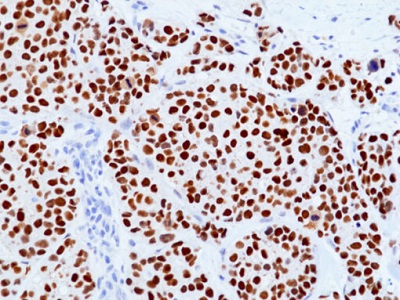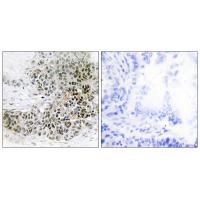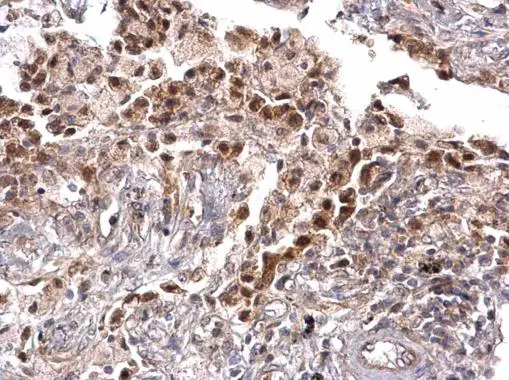
Immunohistochemical staining of formalin-fixed and paraffin-embedded human breast carcinoma tissue sections (ER+, PR+, Her2+; Stage IIA) using anti-TRPS1 Rabbit Monoclonal Antibody (Clone RM518) at 1:100 dilution, for 1 hr at room temperature.
anti-TRPS1, Rabbit Monoclonal (RM518)
REV-31-1410-00
ApplicationsWestern Blot, ImmunoHistoChemistry
Product group Antibodies
ReactivityHuman, Mouse, Rat
TargetTRPS1
Overview
- SupplierRevMAb Biosciences
- Product Nameanti-TRPS1, Rabbit Monoclonal (RM518)
- Delivery Days Customer10
- ApplicationsWestern Blot, ImmunoHistoChemistry
- CertificationResearch Use Only
- ClonalityMonoclonal
- Clone IDRM518
- Gene ID7227
- Target nameTRPS1
- Target descriptiontranscriptional repressor GATA binding 1
- Target synonymsGC79, LGCR, zinc finger transcription factor Trps1, tricho-rhino-phalangeal syndrome type I protein, trichorhinophalangeal syndrome I, zinc finger protein GC79
- HostRabbit
- IsotypeIgG
- Protein IDQ9UHF7
- Protein NameZinc finger transcription factor Trps1
- Scientific DescriptionRecombinant Antibody. This antibody reacts to human TRPS1). It may also react to mouse or rat TRPS1, as predicted by immunogen homology. Isotype: Rabbit IgG. Immunogen: A recombinant protein corresponding to human TRPS1. Applications: IHC, WB. TRPS1 is a member of the zinc finger family of transcription factors and represses GATA-regulated genes and binds to a dynein light chain protein. Binding of the encoded protein to the dynein light chain protein affects binding to GATA consensus sequences and suppresses its transcriptional activity. Defects in this gene are a cause of tricho-rhino-phalangeal syndrome (TRPS) types I-III. - TRPS1 is a member of the zinc finger family of transcription factors and represses GATA-regulated genes and binds to a dynein light chain protein. Binding of the encoded protein to the dynein light chain protein affects binding to GATA consensus sequences and suppresses its transcriptional activity. Defects in this gene are a cause of tricho-rhino-phalangeal syndrome (TRPS) types I-III.
- ReactivityHuman, Mouse, Rat
- Storage Instruction-20°C,2°C to 8°C
- UNSPSC41116161





